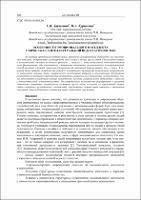Показать сокращенную информацию
Особенности эмоционального интеллекта у взрослых с интеллектуальной недостаточностью
| dc.contributor.author | Лауткина, С. В. | |
| dc.contributor.author | Курносова, Н. А. | |
| dc.date.accessioned | 2020-09-29T13:59:35Z | |
| dc.date.available | 2020-09-29T13:59:35Z | |
| dc.date.issued | 2017 | |
| dc.identifier.citation | Лауткина, С. В. Особенности эмоционального интеллекта у взрослых с интеллектуальной недостаточностью / С. В. Лауткина, Н. А. Курносова // Веснік Брэсцкага універсітэта. Серыя 3. Філалогія. Педагогіка. Псіхалогія. – 2017. – № 2. – С. 180–186. | ru_RU |
| dc.identifier.issn | 2218-029X | |
| dc.identifier.uri | https://rep.brsu.by:443/handle/123456789/2042 | |
| dc.description | The article is devoted to the study of emotional intelligence in adults with intellectual disabilities. The introduction presents a brief analysis of the phenomenon of emotional intelligence as the ability to understand and regulate their emotions and the emotions of other people. The possibilities of studying the mentioned phenomenon in adults with intellectual disabilities and of its formation, stipulating the establishment of adequate interpersonal relationships contributing to successful socio-psychological adaptation of the above persons in the society are discussed. In the main part the methodical complex study of the structural components of emotional intelligence is given; the stages of empirical research are described; the significant results of the study of the structural components of emotional intelligence among the respondents are identified and analyzed. The analysis of the results showed the possibility of studying emotional intelligence in adults with intellectual disabilities. The possibility of formation and development of receptiveness to the emotional state of others, understanding their experiences through a specially organized impacts caused by the intensification of interest in real-life situations, the search for adequate interaction with their social environment is considered. | ru_RU |
| dc.description.abstract | Во введении представлен краткий анализ феномена «эмоциональный интеллект» как способности понимать, воспринимать и регулировать свои эмоции и эмоции других людей. Обсуждается вопрос о возможностях изучения названного феномена у взрослых с интеллектуальной недостаточностью и его формирования, обусловливающего установление адекватных межличностных взаимоотношений, способствующих успешной социально-психологической адаптации вышеназванных лиц в социум. В основной части приведен методический комплекс исследования структурных компонентов эмоционального интеллекта, описаны этапы эмпирического исследования, выявлены и анализированы достоверные результаты исследования структурных компонентов эмоционального интеллекта у респондентов. Анализ результатов исследования показал возможность изучения эмоционального интеллекта у взрослых с интеллектуальной недостаточностью. Рассматривается возможность формирования и развития готовности учитывать эмоциональное состояние других людей, осознания их переживаний посредством специально организованных воздействий, обусловленных активизацией интереса к жизненным ситуациям, поиска адекватного взаимодействия с социальным окружением. | ru_RU |
| dc.language.iso | ru | ru_RU |
| dc.publisher | БрГУ имени А.С. Пушкина | ru_RU |
| dc.relation.ispartofseries | Серыя 3. Філалогія. Педагогіка. Псіхалогія; | |
| dc.title | Особенности эмоционального интеллекта у взрослых с интеллектуальной недостаточностью | ru_RU |
| dc.title.alternative | Peculiarities of Emotional Intelligence in Adults with Intellectual Disability | ru_RU |
| dc.type | Article | ru_RU |
